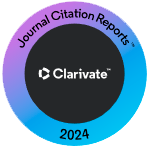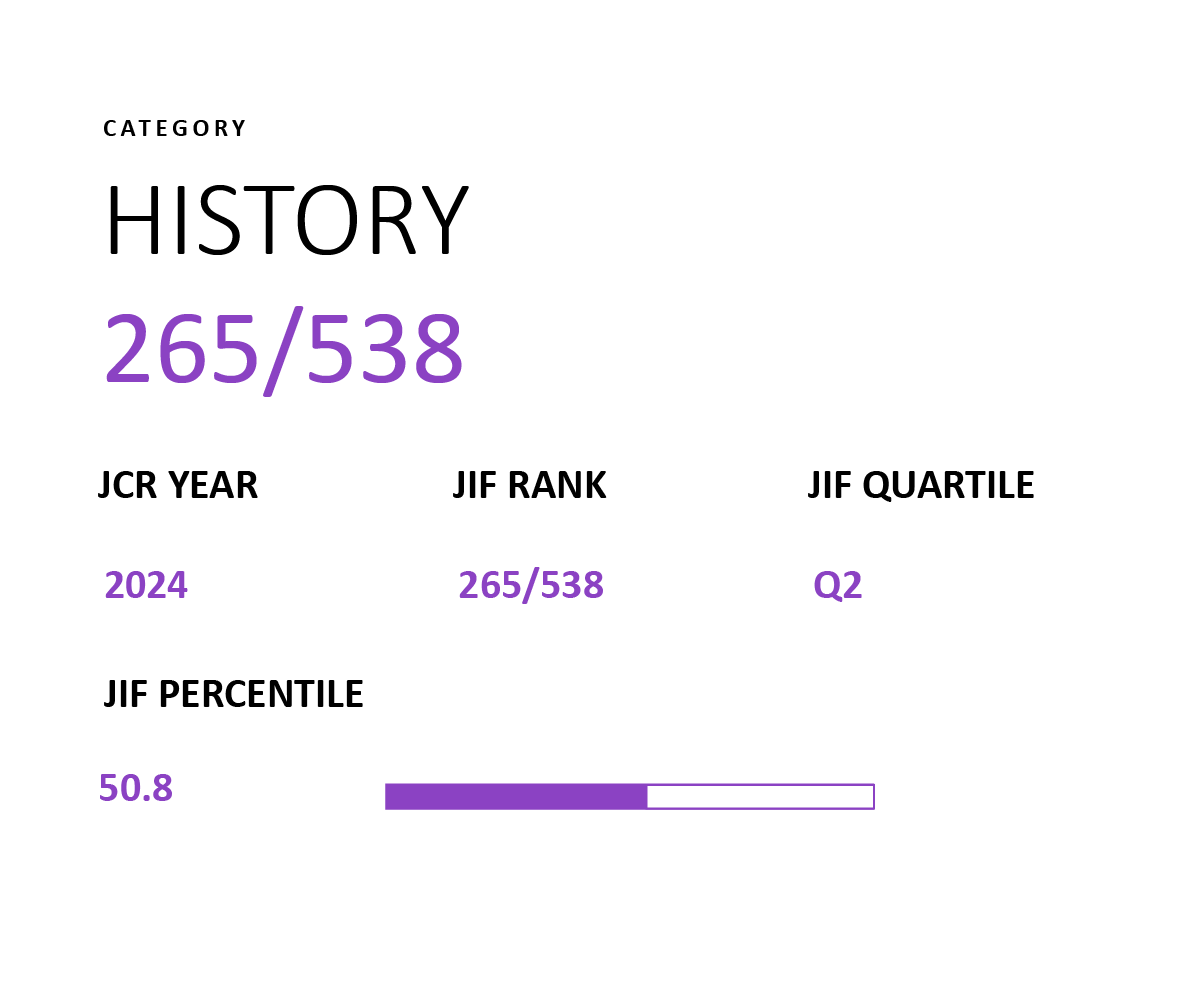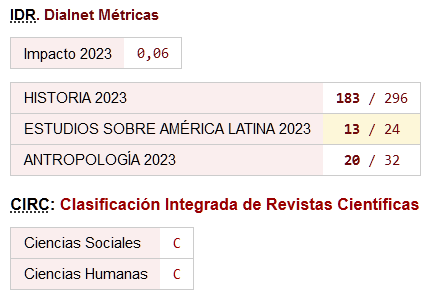Declaración ética
Políticas de Ética de Americanía
1- Sobre la autoría y sus contribuciones
Las normas de presentación de originales a la revista (tamaño, formato y resolución de las imágenes, el sistema para las referencias bibliográficas, etc.) son públicas. Los autores de los textos enviados para su publicación en Americanía son los primeros responsables de su contenido.
Los trabajos de investigación publicados son evaluados por dos especialistas en la materia, siendo responsabilidad del equipo editorial que dicho proceso sea justo e imparcial. Esta revisión será de doble ciego (anonimato de quienes han realizado el trabajo y la evaluación) y los evaluadores deberán razonar su juicio sobre los trabajos por su importancia científica, su originalidad y la claridad de exposición. Es responsabilidad del equipo editorial aceptar o rechazar un trabajo para su publicación, a partir de las evaluaciones recibidas. El equipo editorial debe agradecer la contribución de los evaluadores. El equipo editorial puede rechazar directamente los trabajos recibidos sin recurrir a un proceso de consulta externa si considera que carecen delmínimo nivel de calidad, por inadecuación a los objetivos temáticos y científicos de larevista o por presentar evidencias de plagio.
2- Cómo la revista manejará las quejas, reclamaciones y apelaciones.
En caso de conflicto queja o apelación, el equipo editorial de la revista solicitará al autor las explicaciones y pruebas pertinentes para su resolución. Las quejas, reclamaciones o apelaciones serán tratadas en el seno del equipo de redacción y del comité científico de la revista, comunicándose en todo momento con la persona reclamante. En caso necesario, la revista propondrá a dos evaluadores externos, diferentes de los que ya hayan actuado, para que, actuando como pares ciegos, dictaminen su parecer. En caso de que resulte de la reclamación la desautorización de un trabajo ya publicado, la revista publicará la noticia sobre su desautorización mencionando las razones de tal medida y lo antes posible. La revista notificará la desautorización a los responsables de la institución a la que pertenezca el autor.
3- Sobre los conflictos de intereses / intereses en competencia.
Los miembros del equipo Editorial deberán abstenerse en la gestión directa de un original cuando tengan con el autor relación de parentesco,o formar parte del mismo grupo de investigación, o tener relación contractual o compartir fondos oproyectos de investigación nacionales o internacionales en los últimos años. El equipo editorial se abstendrá igualmente de seleccionar evaluadores que se hallen afectados por estas situaciones. Como la evaluación se efectúa por el método ciego, el equipo editorial incluirá los motivos señalados de exclusión en el formulario de evaluación, de forma que el evaluador pueda abstenerse si considera que incurre en estos casos.
Cuando exista cualquier vínculo comercial, financiero o personal que pueda afectar a los resultados y las conclusiones del trabajo, en el texto de la obra se incluirá una declaración al respecto.
4- Sobre el intercambio de datos y la reproducibilidad.
Los textos presentados para su publicación han de ser el fruto de una investigación original. Han de incluir los datos utilizados y plantear una discusión objetiva de sus resultados, así como la información suficiente para que se puedan confirmar o refutarlas interpretaciones defendidas en el trabajo, señalando la procedencia de las ideas o frases literales tomadas de otros trabajos ya publicados. Cuando se incluyan imágenes como parte de la investigación, se deberá explicar convenientemente cómo se crearon u obtuvieron. En caso de reproducir total o parcialmente material gráfico (figuras, fotos, mapas, etc.) previamente publicado, se citará su procedencia, aportando los permisos de reproducción.
Los autores son responsables de que los datos y resultados expuestos en el trabajo sean originales y no hayan sido copiados, inventados, distorsionados o manipulados. El plagio en todas sus formas, el autoplagio sin citar la procedencia, la publicación múltiple o redundante, así como la invención o manipulación de datos, constituyen faltas graves de ética. Sin embargo, es admisible publicar un trabajo que amplíe otro ya aparecido como comunicación o resumen en las actas de un congreso, citando el texto sobre el que se basa y siempre que las modificaciones supongan una modificación sustancial de lo ya publicado. También son aceptables si la obra se publica en diferente idioma, siempre especificando esta circunstancia y citando la publicación original, que los evaluadores considerarán en su pertinencia.
En el caso de autoría múltiple, el responsable de la obra garantizará el reconocimiento al resto de los autores, considerando que todos los firmantes comparten la responsabilidad del trabajo presentado.
En la publicación se indicarán, si las hubiera, las fuentes de financiación concedidaspara el estudio, mencionando las entidades de origen.
5- Sobre la supervisión ética.
Los autores de los textos enviados para su publicación están obligados a aplicar una norma ética para asegurar su originalidad y autoría. El comportamiento inadecuado podrá dar lugar a la desautorización de su publicación. Ante una conducta impropia, la Revista se reserva el derecho a ejercer las acciones legales que correspondan.
Los evaluadores deben considerar el trabajo que han de revisar como un documento confidencial hasta su publicación, tanto en el transcurso del proceso de revisión como después de este. No podrá difundir ni usar la información contenida en el texto. El evaluador juzgará objetivamente la calidad del trabajo, la información sobre la que se fundamenta, la hipótesis, los datos y su interpretación, así como su presentación yredacción. Debe ser constructivo en sus comentarios y argumentarlos. Debe advertir al equipo editorial de la revista cualquier similitud relevante entre el trabajo a evaluar y otras obras publicadas, indicando posible plagios, falsificaciones o manipulaciones.
Los evaluadores se atendrán a los plazos establecidos, y si alguno estima que no se considera capacitado para juzgar el trabajo, deberá comunicar tal hecho en el menor plazo posible al equipo editorial. Pueden aparecer conflictos de interés cuando el trabajo a evaluar está íntimamente relacionado con el que el evaluador estádesarrollando en ese momento. En estos casos debe renunciar a la tarea y devolver eltrabajo al equipo editorial, indicando los motivos.
6- Sobre la propiedad intelectual.
El equipo editorial de la revista es el responsable de los contenidos publicados, por lo que deben asegurar su calidad científica, evitar las malas prácticas en la publicación de los resultados de las investigaciones y gestionar la edición de los trabajos recibidos una vez se aprueben. Respetaran escrupulosamente la propiedad intelectual de los autores de los mismos, señalándolo en todo momento.
El equipo editorial debe ser forzosamente imparcial al gestionar los trabajos propuestos para su publicación y ha de respetar la independencia intelectual de los autores, a quienes se debe reconocer el derecho a réplica en caso de no haber sido evaluados positivamente. Asimismo, ningún miembro del equipo editorial puede usar para sus propias investigaciones datos o conclusiones contenidos en los trabajos presentados, al menos hasta su publicación, y siempre citando su procedencia, la autoría de los mismos y respetando la propiedad intelectual de sus autores.
7- Las opciones de la revista para las discusiones y correcciones posteriores a la publicación.
El equipo editorial permanecerá siempre a disposición de los autores para cualquier discusión editorial posterior a la publicación, estudiándose en cada caso los pasos a seguir y siempre de común acuerdo.
La revista Americanía se acoge al código de buenas prácticas científicas aprobado por el CSIC en marzo de 2010 y a los acuerdos de buenas prácticas adoptados por el Committee on Publication Ethics (COPE).









